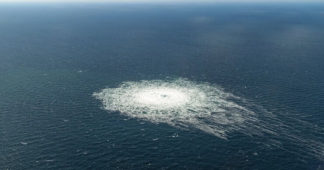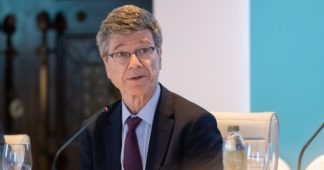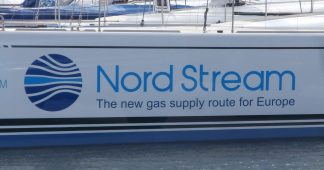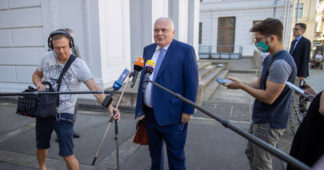Mar 23, 2023
Editor’s Note:
Who blew up the Nord Stream pipelines, one of the EU’s most critical bits of infrastructure? Over a month has passed since American investigative journalist Seymour Hersh disclosed that the US was behind the destruction, a revelation which was followed by reluctance from European countries to respond. And the latest revelations from Hersh allege that Germany held secret discussions with the US and helped the latter make up a cover story. Andrej Hunko (Hunko), a member of the German Bundestag and the Parliamentary Assembly of the Council of Europe, said that the sabotage is a kind of economic warfare, not only against Germany but also the EU, in an interview with Global Times (GT) reporter Li Aixin. It is important to have a critical view and to get to the bottom of it, Hunko added.
GT: Soon after Hersh published the report, “How America Took Out The Nord Stream Pipeline,” you tweeted very soon that you believe his claims were reliable, which is very different from the silence of mainstream politicians/media in Germany and Europe. Why do you believe Hersh’s story is reliable?
Hunko: Hersh’s story is very detailed. It could be a possible explanation. It doesn’t mean it is proven. But from the stories we have on the sabotage of Nord Stream pipelines, I would say it is the most reliable story I’ve seen so far.
Hersh is one of the most famous investigative journalists. He won the highest journalistic award, the Pulitzer Prize. He uncovered war crimes in My Lai, Vietnam, as well as in Abu Ghraib, Iraq.
But from what I saw in Germany, there was not a lot of coverage in the mainstream media or by mainstream parties of what Hersh said. They directly attacked him as a conspiracy theorist, that he is very old now, that he maybe was a good journalist before, but cannot be taken seriously anymore. There is no real debate about his theory. That’s the situation.
The problem with Hersh’s story is that even though there is a very detailed description of what happened, he relies only on one anonymous source. Then we have another story, with another anonymous source, that comes from the US intelligence agencies. In my experience, US intelligence reports cannot be trusted.
But this US story is very much debated in Germany. It says the operation was carried out by six people. This contradicts what we have heard so far from our government, which emphasized this big explosion cannot be carried out by a small terrorist group, but that a state must be behind it. From my point of view, this is much more implausible than Hersh’s story.
GT: What was your first impression after reading a story that suggested the US is behind an act of terror that destroyed a critical infrastructure of its own ally?
Hunko: As I said, I thought this could be true.
The US was very strongly opposed to these pipelines, Nord Stream I and II. Back in 1982, US president Ronald Reagan had a Soviet pipeline blown up. There have been many threats and sanctions against companies supporting Nord Stream II, and even against the port of Lubmin, a small German city, where the Nord Stream pipelines go.
In addition, at a joint news conference with German Chancellor Olaf Scholz in early February 2022, Biden said if Russia invades Ukraine, there would no longer be Nord Stream II. He was asked by a journalist, how this could happen, given that it was under German Control. He said: “I promise you, we will be able to do it.” So, there was a direct threat from the US. This is not a proof. But there are a lot of probabilities and indications in that direction.
The major media in Germany didn’t make a big deal about it. We had a debate in Parliament, but most of the parties avoided discussing the content of Hersh’s article. They just attacked Hersh personally and those in Germany who wanted to talk about it. I am very critical of the way this was perceived here in Germany.
I am a member of the opposition. I am a Member of Parliament. We made several inquiries. And the answers were very poor. The government only said that Attorney General’s Office is working on the matter, and that they couldn’t give us information because it is against the interests of the state.
GT: How is finding out the truth on critical infrastructure sabotage against the interests of the state?
Hunko: If there is a possibility that (Hersh’s story) is real and the US did it, maybe they even informed Scholz about it. I don’t know… I mean he was there when Biden made the threat of ending Nord Stream. If this is true, this would cause a deep political crisis in Germany, a deep political crisis in relations with the US, and would have an impact on the war in Ukraine.
There are high-level interests in not following Hersh’s story. I’m not sure; I do not have the means to investigate it. But yes, that could get certain state interests in trouble.
GT: But do you think we need to get to the bottom of it to find the answer?
Hunko: Of course, we have to. And that is also the reason why we are pushing for it.
The problem is now, that we have three different national investigations, each conducted separately by three countries: Sweden, Denmark and Germany. It is not one joint investigation. I cannot understand why. But I still think that at the moment, an international investigation into what happened would be best, with a strong international investigation team organized by the UN, which has the actual investigative authority. But given the high-level political interests of different sides, which would be affected by this or that outcome, an international investigation is currently blocked.
Our call for a UN international investigation team, is not supported by the ruling parties here. They say we will do our own investigation with our own Attorney General. We should trust the Attorney General.
In general, I would say Germany is a rule-of-law state. But if there are high-level interests, as in some delicate historical situations in Germany as well, we should not always trust these state institutions 100 percent.
At this time, in this case, it is important to have a critical view.
GT: What costs or consequences is Germany confronting since the pipeline’s destruction?
Hunko: The two pipelines brought cheap natural gas from Russia to Germany. Because of the sabotage, there is now no way to use these options. Before, it was a decision under political pressure whether to use gas or not. But now, there is no infrastructure to use gas. This is the biggest impact.
On the other hand, we now receive a lot of gas from the US, liquefied natural gas (LNG), which is by far more expensive and worse from an ecological point of view.
Dependence on Russian gas has now turned into a dependence on US gas, which is as well a problem. There is no possibility for Germany to choose which gas is better and cheaper and which is ecologically better. That option has been damaged.
There are debates whether it is possible to repair it. But right now, that possibility is gone.
GT: Some observers say that the pipeline explosions are to some extent equivalent to an economic war against European countries, against Germany. What’s your take?
Hunko: It is a kind of economic war not only against Germany, but also against the EU. The willingness of the EU bodies to investigate the perpetrators is even worse than in Germany.
Who benefits from this? It’s clear. It’s mainly the countries that export the gas to Germany; it is mainly the US. This means not only higher prices for gas for the German population, but also a problem for German industry.
German economic model is highly dependent on low energy prices, a highly-skilled workforce, and exports. And when the energy prices rise so much, it is no longer as interesting for big companies to stay in Germany. Right now, some are migrating to the US. It is a kind of economic competition between the US, Germany and Europe.
GT: When it comes to the Ukraine issue, you have been advocating peace and negotiations, rather than sending more weapons to Ukraine. Why do you think the call for peace and negotiations has been long marginalized from mainstream views in the decision-making circle?
Hunko: This is one of the most disturbing issues – the idea of holding negotiations is blocked by most NATO and EU states.
There were negotiations in March 2022, but they were stopped, mainly by the West. Now it is always affirmed here that there is no need to talk about negotiations as Russia doesn’t want to negotiate.
But if you look outside the EU and NATO bubble, most of the world is in favor of negotiations. For example, President Lula of Brazil is trying to set up a so-called peace club with other countries from the Global South, with China and maybe India. There was a12-point plan from China, an idea that should be discussed more.
The vast parts of the world want peace and negotiations because they are suffering. But in Germany, the mere idea of negotiating is treated as a kind of betrayal. The established parties here have the idea they can win the war – not only push the Russians back behind the February 24 borders, but also, as they call it, liberate Crimea, a total victory.
This idea is very dangerous because that would mean a further and further escalation of the war.
GT: Some observers say Europe no longer shares that much common interest with the US. What’s your take?
Hunko: In Europe, the mood is very different on this issue. For example, in Germany, the population is divided. Half of the population says we should continue the war and send more weapons, even if that means more people die, but it’s so important to win this war. And the other half of the population says, no, we should find a compromise, even if that means accepting that parts of Ukraine will come under Russia’s control.
But many people are beginning to realize that prolonging the war serves US interests.
Now we have a military alliance like NATO, but there is also a lot of competition between the US and Europe, especially with Germany and France. People are realizing more and more that we are the losers in this game if this war goes on for years and years. I think there is a growing sentiment that this war is against our own interests, and people here will suffer from unemployment, high prices, inflation, and so on.
We are in a very dangerous international situation. I think the most important thing is that the changes we will face are peaceful and that we don’t go into a big war between NATO and Russia or even NATO and China. This is my most important message.
We remind our readers that publication of articles on our site does not mean that we agree with what is written. Our policy is to publish anything which we consider of interest, so as to assist our readers in forming their opinions. Sometimes we even publish articles with which we totally disagree, since we believe it is important for our readers to be informed on as wide a spectrum of views as possible.










